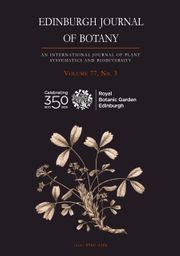No CrossRef data available.
Article contents
NOMENCLATURE AND TYPIFICATION OF VARIOUS MYRTACEAE OCCURRING IN SOUTHEAST ASIA
Published online by Cambridge University Press: 27 March 2018
Abstract
The nomenclature of a number of taxa that occur in Southeast Asia in Baeckea, Decaspermum, Leptospermum, Melaleuca, Psidium, Rhodamnia, Rhodomyrtus and Tristaniopsis is discussed: eight lectotypes are designated, six taxa are shown to have been previously lectotypified under Article 9.9 with second-stage lectotypification being deemed unnecessary for two of them, and comments are made on two species that we cannot yet typify.
Keywords
- Type
- Articles
- Information
- Copyright
- Copyright © Trustees of the Royal Botanic Garden Edinburgh (2018)
References
Aiton, W. (1789). Hortus Kewensis or a Catalogue of the Plants Cultivated in the Royal Botanic Garden at Kew, vol. 2, London: George Nicol.Google Scholar
Bean, A. R. (1997). A revision of Baeckea (Myrtaceae) in eastern Australia, Malesia and south-east Asia. Telopea 7 (3): 245–268.Google Scholar
Blake, S. T. (1968). A revision of Melaleuca leucadendron and its allies (Myrtaceae). Contr. Queensland Herb. 1: 1–114.Google Scholar
Blume, C. L. (1825–1826). Bijdragen tot de Flora van Nederlandisch Indië. Batavia: Ter Lands Drukkerij.Google Scholar
Brophy, J. J., Craven, L. & Doran, J. C. (2013). Melaleucas. Their Botany, Essential Oils and Uses. Canberra: Australian Centre for International Agricultural Research and Rural Industries Research and Development Corporation.Google Scholar
Candolle, A. P. de (1828). Prodromus Systematis Naturalis Regni Vegetabilis, vol. 3. Paris: Treuttel & Würtz.Google Scholar
Cavanilles, A. J. (1797). Icones et Descriptiones Planterum, vol. IV. Madrid: Ex Regis Typographia.Google Scholar
Craib, W. B. (1926). Contributions to the Flora of Siam. Additamentum XVIII. Bull. Misc. Inform. Kew 1926: 154–174.Google Scholar
Craven, L. (2006). New combinations in Melaleuca for Australian species of Callistemon (Myrtaceae). Novon 16 (4): 468–475.Google Scholar
Dumont de Courset, G. L. M. (1802). Le Botaniste Cultivateur. Paris: H. L. Perronneau.Google Scholar
Dumont de Courset, G. L. M. (1811). Le Botaniste Cultivateur, 2nd edition. Paris: J. J. Fuchs.Google Scholar
Gaertner, J. (1788). De Fructibus et Seminibus Plantarum. Stuttgart: Sumtibus Auctoris.Google Scholar
Gagnepain, F. (1920). Barringtonia et Decaspermum nouveaux. Bull. Mus. Natl. Hist. Nat. 26: 73–74.Google Scholar
Gagnepain, F. (1921). Myrtacées. In: Lecomte, H. Flore Générale de l'Indo-Chine, vol. 2, pp. 788–864. Paris: Masson.Google Scholar
Hance, H. F. (1876). Corolla Pierreana; sive stirpum Cambodianarum a cl. L. Pierre, horti bot. Siagonensis praeposito, lectarum ecologae. J. Bot. 5: 257–262.Google Scholar
Hasskarl, J. K. (1842). Plantarum genera et species novae aut reformatae javenses. In: Flora 25 (Band 2, Beiblatt 1).Google Scholar
International Plant Names Index (no date). Online. Available: http://www.ipni.org (accessed 9 January 2017).Google Scholar
Jarvis, C. (2007). Order Out of Chaos. Linnean Plant Names and their Types. London: Linnean Society of London and Natural History Museum.Google Scholar
Kurz, S. (1877). Contributions towards a knowledge of the Burmese flora. J. Asiat. Soc. Bengal 46: 49–258.Google Scholar
McNeill, J., Barrie, F. R., Buck, W. R., Demoulin, V., Greuter, W., Hawksworth, D. L., Herendeen, P. S., Knapp, S., Marhold, K., Prado, J., Prud'homme van Reine, W. F., Smith, G. F., Wiersema, J. H. & Turland, N. J. (eds and comps) (2012). International Code of Nomenclature for Algae, Fungi and Plants (Melbourne Code), Adopted by the Eighteenth International Botanical Congress Melbourne, Australia, July 2011. Regnum Vegetabile 154. Oberreifenberg: Koeltz Botanical Books.Google Scholar
Merrill, E. D. & Perry, L. M. (1938). The Myrtaceae of China. J. Arnold Arbor. 19: 191–247.Google Scholar
Miquel, F. A. W. (1860). Flora van Nederlandsch Indië. Amsterdam: C. G. van der Poste.Google Scholar
Parnell, J. & Nic Lughadha, E. (1992). Notes on Thai Myrtaceae. Kew Bull. 47 (4): 703–706.Google Scholar
Persoon, C. H. (1806). Synopsis Plantarum, Seu Enchiridium Botanicum Complectens Enumerationem Systematicum Specierum Hucusque Cognitorum. . . Paris: C. F. Cramerum.Google Scholar
Powell, R. (1809). Pharmacopaeia of the Royal College of Physicians of London, pp. 21–22. London: Longman, Hurst, Rees and Long.Google Scholar
Raddi, G. (1821). Di Alcune Specie di Pero Indiano Memoria di Giuseppi Raddi. Bologna: Annesio Nobili.Google Scholar
Rees, M. (1812). The Cyclopedia or Universal Dictionary of Arts, Sciences and Literature [also known as Rees's Cyclopedia], vol. 23. London: Longman, Hurst, Rees, Orm and Brown.Google Scholar
Ridley, H. N. (1912). New and rare Malayan Plants. J. Straits Branch Roy. Asiat. Soc. 61: 1–43.Google Scholar
Ridley, H. N. (1928). XIII. – Decades Kewensis Plantarum Novarum in Herbario Horti Regii Conservatarum. Decas CXIX. 1183. Bull. Misc. Inform. Kew 74.Google Scholar
Roxburgh, W. (1832). Flora Indica; or, Descriptions of Indian Plants, vol. III. Calcutta: W. Thacker & Co.Google Scholar
Rumphius, G. E. (1741). Herbarium Amboinense, vol. 2. Amsterdam: Changuion, Catuffe & Uytwerf.Google Scholar
Scott, A. J. (1978). A revision of Rhodomyrtus (Myrtaceae). Kew Bull. 33 (2): 311–329.Google Scholar
Scott, A. J. (1979b). The Austral-Pacific species of Decaspermum (Myrtaceae). Kew Bull. 34 (1): 59–67.Google Scholar
Skeels, H. C. (1913). Seeds and plants imported during the period from January 1 to March 31, 1912. Inventory no. 30, nos 32369 to 33278. Bull. Bur. Pl. Industr. U.S.D.A. 282: 49.Google Scholar
Smith, J. E. (1797). Botanical characters of some plants of the natural order of Myrti. Trans. Linn. Soc. 3: 255–288.Google Scholar
Stafleu, F. A. & Cowan, R. S. (1979). Taxonomic Literature, Volume II, H–Le. Utrecht: Bohn, Scheltema & Holkema.Google Scholar
Sweet, R. (1826). Sweet's Hortus Britannicus Arranged in Natural Orders: With the Addition of. . . London: James Ridgeway.Google Scholar
Wight, R. (1843). Icones Plantarum Indiae Orientalis [Figures of Indian Plants], vol. 2. Madras: J. B. Pharoah.Google Scholar


